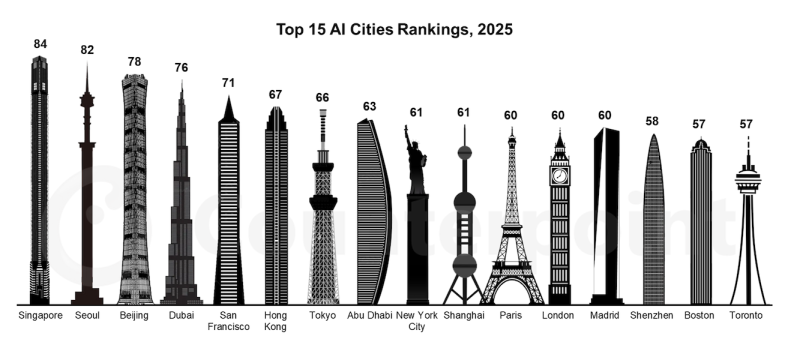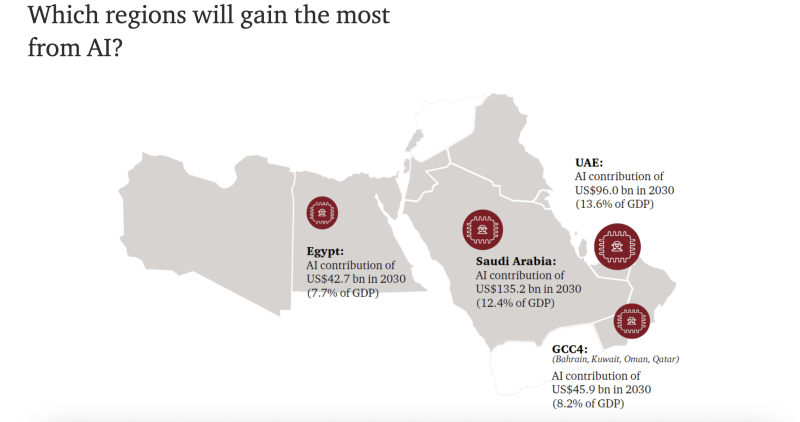- The U.S. and China dominate the global AI landscape but South Korea and Saudi Arabia have entered the ring
- South Korea is focusing on building sovereign AI with massive state-led investments
- Saudi Arabia’s AI strategy leverages global partnerships, key initiatives and huge investments from global tech giants
Today, the U.S. and China dominate the global AI landscape but South Korea, the United Arab Emirates (AE), Singapore, India and Saudi Arabia, are trying to close the gap. South Korea and Saudi Arabia stand out because of their massive investments and commitment to advancing their position in the global AI ecosystem.
South Korea is focusing on building sovereign AI, backed by a strong regulatory push. It aims to bring down dependency on foreign platforms and boost its global competitiveness. AI is a crucial part of Saudi Arabia’s Vision 2030, which seeks to reduce its reliance on oil and emerge as a knowledge economy.
South Korea
Over the last few years, South Korea has made several investments in developing a full-stack AI infrastructure. Last year, it announced an investment of $7 billion in AI by 2027 to retain an edge in the global AI ecosystem. It also included an investment of approximately $1 billion (KRW1.4 trillion) to foster AI semiconductor firms. The country has also announced a $73 billion public-private investment fund to develop the country’s AI infrastructure.
It also recently announced plans to invest an additional $11.56 billion over the next five years to establish itself as one of the world’s top three AI powerhouses. The investment will focus on securing advanced GPUs, developing AI infrastructure and building AI data centers, among others.
“The government of Korea is currently prioritizing the development of native AI models, a strategy that appears to carry significant potential rewards but also has considerable risks. This approach could lead to highly optimized AI models tailored to Korean culture, potentially offering a more cost-effective alternative to global models,” said Daeil Chun, Senior Research Manager – AI Research at IDC Korea.
“By focusing on the foundational layer of AI technology, this initiative also has the potential to foster a robust local AI ecosystem, strengthening the entire technological stack rather than just the application layer,” added Chun.
However, this approach comes with a challenge. “The global landscape of AI models and standards is evolving at a rapid pace, making it difficult to keep pace with these changes. Additionally, the lesser emphasis on AI applications could, in turn, slow down the country's overall rate of AI adoption,” he said.
The government’s initiatives are supported by telecom operators like SK Telecom and LG Uplus, among others. For instance, South Korea’s Ministry of Science and ICT recently announced the selection of five teams, SK Telecom, LG AI Research, Naver Cloud, Upstage and NC AI, to lead the country’s sovereign AI foundation model project.
In addition, Samsung’s contribution in chips, along with the upcoming startups like Rebellions, are likely to contribute to the overall development of the country’s AI infrastructure.
Saudi Arabia
AI is one of the pillars of Vision 2030, a Saudi government initiative launched to develop a digital-first society. State-backed companies, such as the Saudi Company for Artificial Intelligence (SCAI) and Humain, are playing a crucial role in advancing the country’s position in the global AI landscape.
Humain is funded by Saudi Arabia’s Public Investment Fund (PIF) and is led by Tareq Amin, a well-known technology executive who was previously heading Japan’s Rakuten Mobile.
A key component of Saudi Arabia’s strategy is that it is keen to leverage global partnerships to grow. For instance, Humain, which was formed only in May this year, has already partnered with NVIDIA, Amazon Web Services (AWS), Cisco and Qualcomm, among others. Humain plans to provide a range of AI services, including data centers, AI infrastructure, cloud and advanced AI models and solutions. It will also offer multimodal Arabic large language models. It also plans to launch $10 billion venture capital fund.
A hallmark of Saudi Arabia’s AI plans is massive investment from global tech companies. Earlier this year, President Trump visited Saudi Arabia, which also marked announcements of several investments by American companies. For instance, tech giant AWS plans to invest $5.3 billion to develop a new AWS region in the country. Similarly, Oracle announced $14 billion investment in the country’s AI and Cloud infrastructure over the next 10 years.
The Saudi Arabian government is deploying AI across several sectors, including healthcare, education, public services and energy.
AI rankings by city
In the recent Counterpoint Research study on top AI cities, Seoul was ranked as the second AI city world, second only to Singapore. “Riyadh was named as one of the eight fastest growing AI cities in the world, due to a very strong government-driven investment policy that will see up to $100 billion invested in the space via the Public Investment Fund (PIF),” said Marc Einstein, Research Director at Counterpoint Research.

Who will gain the most from AI?
A recent PwC report says that AI will have an economic impact of $320 billion in the Middle East by 2030, with Saudi Arabia contributing $135.2 billion.

Another country that is giving strong competition to Saudi Arabia in the Middle East region is the United Arab Emirates (UAE), which created a dedicated Ministry of AI way back in 2017 and also formed the Mohamed bin Zayed University of Artificial Intelligence to promote the technology development.
Commenting on the factors that can help countries lead in the global AI race, Chun of IDC Korea says, “A key factor is the removal of administrative and nationalistic barriers that might prevent top-tier talent from contributing. Allowing individuals with experience from global R&D frontiers to freely participate in domestic AI initiatives is crucial for infusing local efforts with cutting-edge knowledge and methodologies.”
In addition, collaboration with global AI leaders is emerging as a crucial factor. “Establishing partnerships ensures that local initiatives remain aligned with the latest trends, paradigms, and standards, preventing isolation and fostering an environment of continuous learning and innovation,” adds Chun.
Significantly, both countries take strategic positions that maintain geopolitical equations. South Korea and Saudi Arabia avoid taking direct hardline positions where supporting China or the U.S. is concerned. The global AI race is no longer limited to the U.S. and China, but other countries are gaining ground, promising exciting developments ahead.